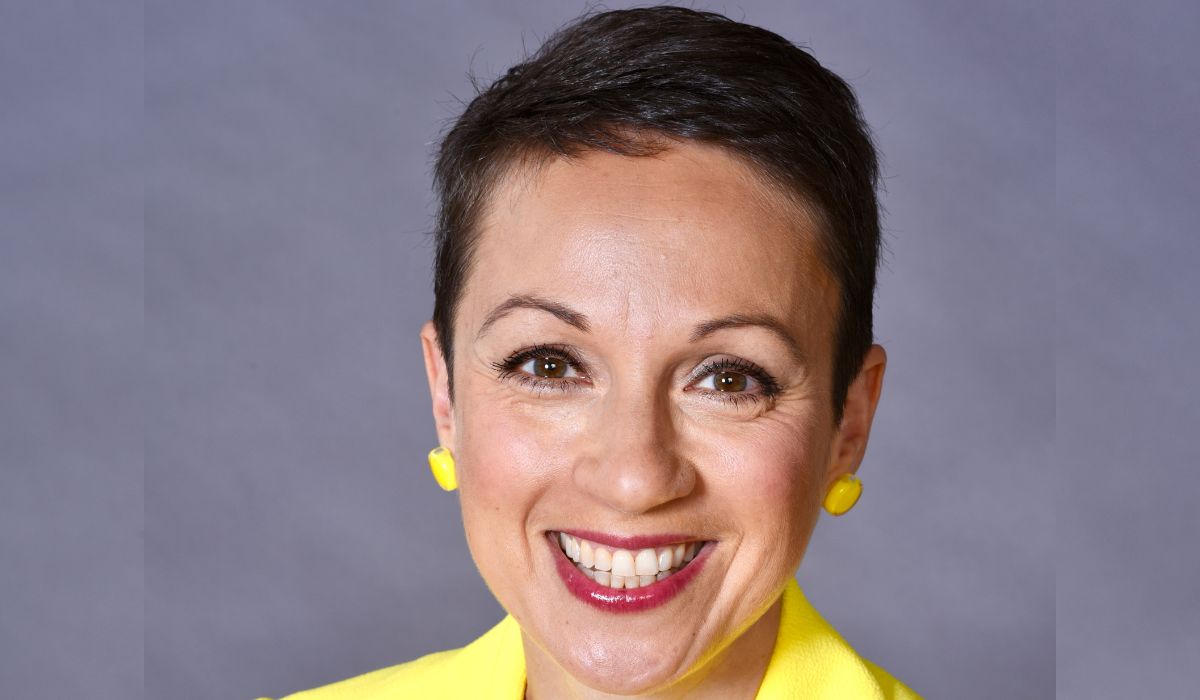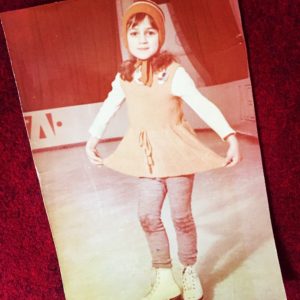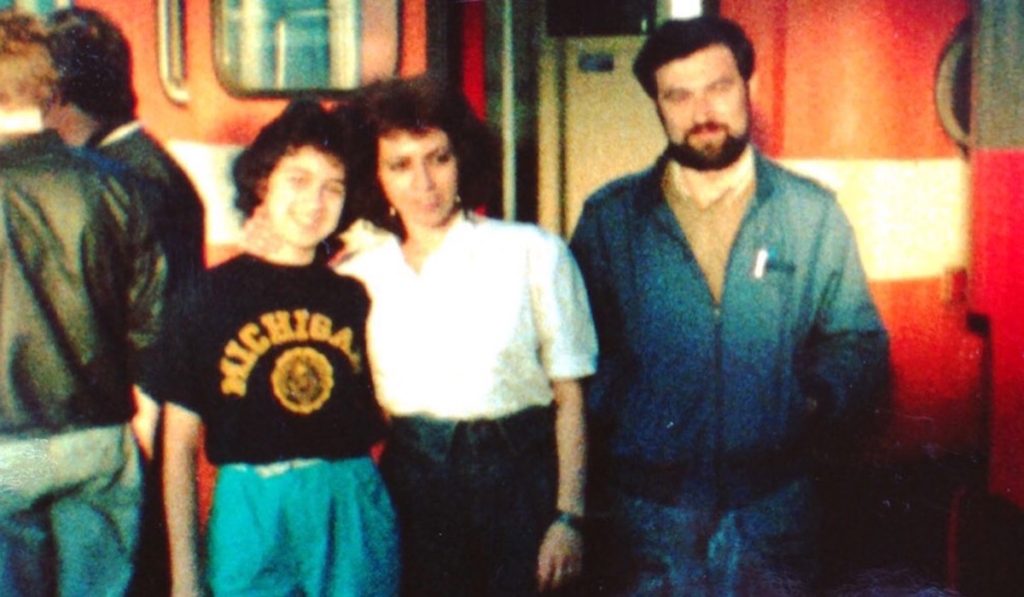Strengthening Your Emotional Fitness Can Help You Be a Force for Good, Says Russian Refugee and Best-Selling Author Nataly Kogan. These 5 Practices Will Help You Get Started This Week (They Take 5 Minutes or Less!)

I grew up in the former Soviet Union, and my parents and I were considered second class citizens because we were Jewish.
I’ll never forget the logbook in my school: Next to your name it said “Jew” if you were Jewish. Interestingly, Ukrainian students were also singled out, with a “Ukraine” placed next to their names. Russia was never friendly to us; we were persecuted and lived in a hostile situation. Which is why my parents and I left in May of 1989, when I was 13 years old.
We were only allowed $200 per person and one suitcase each. One of my most vivid memories is getting off the plane in Austria (a country that volunteered to take in Russian Jews), where we were met by a man with a clipboard: “Israel or the U.S.?” he asked us. We renounced our Russian citizenship and spent two weeks in a refugee settlement in Vienna. I’ve never seen my parents so scared in all my life. After an interview for our U.S. paperwork, my dad looked at my mom and said, “I don’t feel good, because the family interviewed after us were beat up and we weren’t. We’re not going to get in.”


But we did get refugee status, and we flew to Ann Arbor, Michigan, where we began our American dream.
Russia’s unprovoked invasion of Ukraine has made me think a lot about our escape from such a hostile environment—and how it cemented in me from an early age a go-to mode of struggle. My parents and I have black belts in struggling! Despite the opportunity to live a better life in this country—and yes, even realizing the American dream—that struggle eventually led to serious burnout, which in turn forced me to consider why I was struggling so much.
What became clear is this: If I am struggling and running on empty all the time, I can’t be the human being I want to be. These days, I’m on a mission to help others struggle less and feel more connected. I believe every single person has the capacity to be a force of good in the world. Yet it’s crucial to realize that we’re also human, and the human part of us means we must take care of ourselves. We must do the inner work—and strengthen our emotional fitness—especially when times are difficult.
The news is so upsetting right now. Yet while you can’t fix all the ills in the world, you can do something within your sphere of impact. Reading the news for three hours? That doesn’t help anyone. Just being upset about something doesn’t change it. But when you have energy and a sense of purpose, you can have a positive impact. Strengthening your own emotional fitness is your responsibility to yourself, to the work you care about, and to every single person you interact with. After all, we pass on our joy and we pass on our stress. When we fuel ourselves, we fuel everyone around us.

Doing this inner work may not directly help the situation in the Ukraine. Accepting this is step No. 1 of boosting your emotional fitness. However, can you do one small thing in your sphere to have a positive impact on another human being? Imagine if we all did that. It would surely reach someone in Ukraine.
If you’re feeling hopeless right now, and unsure of what to do, read on. I’m sharing the five key skills of emotional fitness, as well an exercise that’ll help you practice each skill this week.
Skill No. 1: Acceptance
What it is: Acknowledging your feelings and the situation with clarity instead of getting caught up in your brain’s stories and using that as your starting point for moving forward.
Every time you edit your story and your thoughts and witness yourself instead of judging yourself, you’re practicing acceptance. I used to hate the word acceptance! It felt like resignation or rolling over and just accepting everything as it was without trying to solve problems or make things better. I hated that!
Coming to the United States as a refugee when I was a teenager was such a difficult experience that it cemented my view of life as a fight: me against tough reality. I fully embraced my identity as a fighter, fixer, and improver! When friends or colleagues shared something they were struggling with, I would immediately go into fixer mode, flooding them with advice whether they asked for it or not.
Yet what I’ve learned is that acceptance doesn’t have anything to do with resignation, giving up, or being passive. Just like self-acceptance, acceptance is the skill of boldly embracing reality so you can stop wasting energy fighting it and instead use that energy to figure out the best way forward given how things are and how you feel.
How to practice acceptance this week: Embrace your stress. Give yourself five to 10 minutes to feel what you feel. (You might want to set a timer.) Tell your brain that this is your time to stress out—no judgment. Take out a piece of paper or use the Notes app on your phone to write about your stress. Don’t judge—just write down everything you’re stressed about. Then, read through what you wrote. Is there anything you can learn? Has your brain made up negative and dramatic stories you could edit?
After you’re done, take a deep breath and give yourself permission to move on with your day. Your brain will have an easier time letting you do this because you’ve acknowledged how you feel.
Skill No. 2: Gratitude
What it is: Making an active choice to appreciate the small, positive moments in everyday life—even when times are challenging—and sharing your appreciation for other people with them.
When I first came to the U.S., I thought gratitude was that thing you did on Thanksgiving where you went around the table, said thanks for the food and your friends and family, and then gobbled up the food (OMG so much food—I love Thanksgiving!).
Doing this once a year seemed just fine. But when I was really struggling, I came across research suggesting gratitude was something I should practice regularly. So, I decided to do a 30-day gratitude experiment, where I committed to writing down three good things about my day and one kind and grateful interaction with another person.
The result? For what felt like the first time in my life, I was enjoying the simplest everyday moments without running through them on autopilot. I’m talking about really small things, like sitting down with a cup of coffee, having a quick chat with my daughter before work, or pausing to look at the tulips on our kitchen counter.
Turns out that when you are grateful for the little things, they become the big things that fuel you with so much meaning.
How to practice gratitude this week: Before reading your first email, social media post, or news article in the morning, think of three things you’re grateful for. When you do this, be genuine—don’t just tick off a bunch of things but rather find things you genuinely appreciate. Also, be specific! If you keep your gratitude general (“I’m grateful for my family” or “I’m grateful for my health”) your brain will just dismiss it. Finally, capture your gratitude in some way. Jot down your gratitude moments on an index card or in the Notes app on your phone, photograph what you’re grateful for, or text or email your list to someone else!
Skill No. 3: Self-Care
What it is: Intentionally fueling your emotional, mental, and physical energy.
Your energy is your fuel. Would you expect a car to be able to run without fuel? No. The car doesn’t either “deserve” fuel or not. It needs fuel to function. It can’t do its job of being a car without fuel.
Same is true for us humans: We can’t function without energy. We can’t do all the things we need and want to do and do them well without having enough emotional, mental, and physical energy. We can’t do our job of being human without fuel—and self-care is the skill of making sure we have enough of it.
When you practice self-care, you intentionally do things to fill your energy reservoir and limit doing things that unnecessarily drain it. This second part is so important, but it doesn’t get nearly enough oomph when we talk about self-care. When you practice self-care consistently and keep your energy reservoir fueled most of the time, your self-care practice will take less time.
How to practice self-care this week: Write a no-guilt, self-care, talk-back to your brain script. If I could live in your brain and give it a pep talk every time it tried to make you feel guilty about practicing self-care, I would. But I can’t, so I want you to write your own talk-back to your brain script and use it to give yourself a pep talk.
First, make a list of ways your self-care benefits other people. For example, “I’m more patient with my kids after I do some yoga,” or “I’m more patient with my colleagues when I’m energized.” Then, write a short pep talk you can read to yourself whenever your brain tries to make you feel guilty about practicing self-care. Think about what your brain might fear to cause it to make you feel guilty (you won’t get stuff done, other people will disapprove, etc.) and address that head-on in your script.
Skill No. 4: Intentional Kindness
What it is: Being actively kind and compassionate toward others without expecting anything in return.
I used to approach my days like a series of sprints I had to finish as efficiently as possible. Who had time to stop and chat with a colleague or actually look at the barista handing me my coffee and say “thank you”? Not busy people like me.
Don’t get me wrong: I wasn’t rude, and it’s not like I never said “thank you” to people. It’s that I saw no purpose in small, kind interactions with others, especially people I didn’t know. Yet when I completely burned out, I couldn’t sprint through my days. My efficiency became useless because I could hardly function. Suddenly, there was time and space in my days, which created room for kindness.
At first, this was completely unintentional. I started moving more slowly. I found myself actually saying hello to the person behind the counter, noticing that she was wearing funky earrings and telling her that I liked them. I’d smile and say “hi” to the people in line behind me at the grocery store. I began to make it a point every week to check in on family and friends, with no occasion required, and made more time to truly listen to what they shared.
I traded some of my efficiency for kindness and gave myself the amazing gift of warmth and human connection.
How to practice intentional kindness this week: Simply listen. One of the things I discovered when I stopped thinking of kindness in big and bold acts was how much power there is in simply listening to another person. It’s one of the kindest things we can do for each other.
When we ask someone how they’re doing, our brain starts to think of what we’re going to say when they are done—which often involves sharing advice or relating our own similar experience. But this isn’t really listening. It’s more like information exchange.
So, think about how great it feels when people really listen to you, without interrupting, trying to fix your problem, giving advice, or making you feel they would rather be doing something else. Then, try to give someone else the gift of this kind of listening. There’s a good chance it’ll help both you and the person you’re listening to experience a feeling of belonging—and like other acts of kindness, it’s a boomerang that comes back to you.
Skill No. 5: The Bigger Why
What it is: Regularly connecting with your sense of meaning and purpose by identifying how your daily activities and tasks support bigger goals, help others, or contribute to a cause you believe in.
A sense of meaning is one of those things you know when you feel it, but it can be difficult to describe. Just as we need to feel that we’re not alone and we belong to something greater than ourselves, we need to feel that our lives have purpose. Having a sense of meaning is linked to greater emotional, mental, and physical well-being, with studies showing that it reduces stress and risk of depression and increases social connection and motivation.
How to practice the bigger why this week: As you go through the week, begin to look at your daily activities and ask yourself:
- Who does this help? (my colleagues, my customers, my family, etc.)
- How does this contribute to a goal I’m working toward? (becoming a better artist or writer, getting into better shape, etc.)
- How does this positively impact something outside of myself (it helps the environment, makes my neighborhood more beautiful or safer, etc.)
Of course, I’m not asking you to do this for every single thing you do this week. (Please, go ahead and brush your teeth just like you normally would.) But do it for a few tasks, especially if they are stressful or if you can’t think of any possible way they could be meaningful. Then, notice how you feel when you connect something you do to a greater sense of meaning and purpose.


